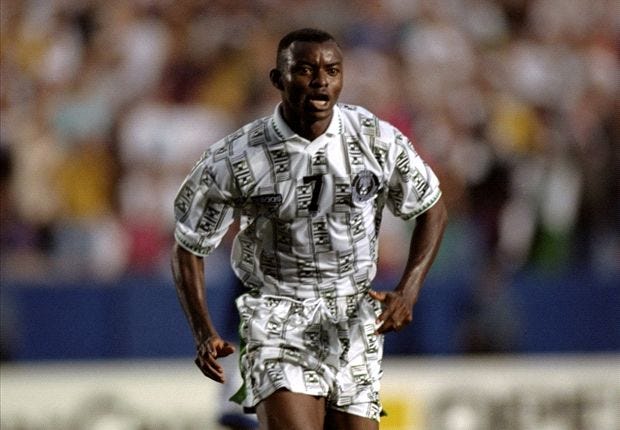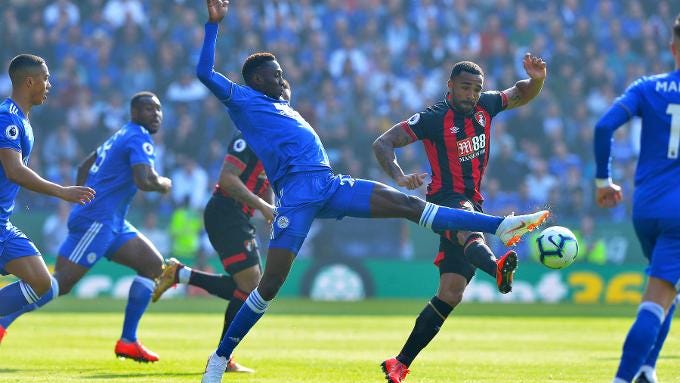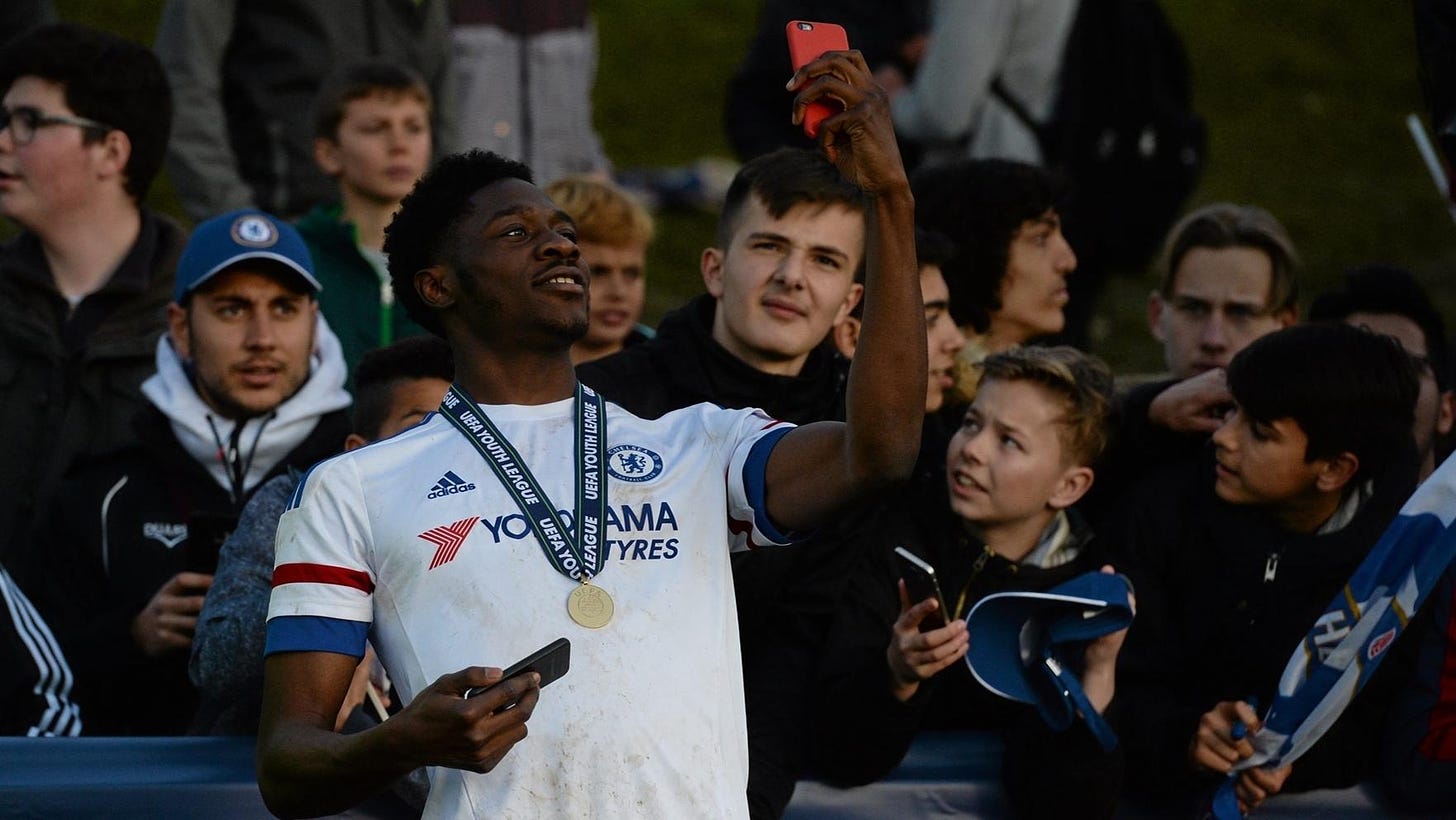Nigeria's secret midfielder
Some gutsy, outside-the-box thinking could quickly resolve the Super Eagles lack of numbers in the middle of the park
Sometimes, quite complex problems have fairly simple solutions.
Just ask former Nigeria international Friday Ekpo. As he tells it, a mundane conversation was the spark that ignited the career of Finidi George, who is justifiably regarded as one of the country’s finest wingers ever.
Finidi, at the time a young central midfielder with Port Harcourt club Sharks, earned a maiden call-up to the senior national team ahead of an Africa Cup of Nations qualifier against Burkina Faso in July, 1991. There, he was reacquainted with the more experienced Ekpo, with whom he had briefly played while at Calabar Rovers, and received a germ of insight that proved the making of him.
In 1991, the national team midfield pool was relatively saturated, with the likes of Ekpo himself, Edem Fuludu and Thompson Oliha holding sway. In Ekpo’s mind, Finidi’s chances of actually getting minutes were severely limited.
His approach to the problem was forthright. “It's not because I'm in midfield,” he recalled telling the 20-year-old newbie in an interview with sports historian Calvin Onwuka. “I wish all of us could play in midfield together. But you won't find space.”
His recommendation? “There's nobody at outside right, and you have speed. I will supply you balls, use your pace. Just go there. Whenever I have the ball, at the mention of [my name], I'll know where you are.”
On as a substitute against the visiting Burkinabes, Finidi ran riot down the right on game day. Receiving the ball time and again in space from Ekpo, he repeatedly found centre-forward Rashidi Yekini with flighted deliveries, assisting thrice and getting on the scoresheet himself.
To borrow a worn, dog-eared cliché, the rest is history.
It was at the 2019 Africa Cup of Nations that it first occurred to me that the tactical leanings of Nigeria’s senior men’s national team could closely mirror Leicester City’s.
The catalyst for that train of thought was the Round of 16 meeting between the Super Eagles and eternal rival Cameroon. It is a tie seemingly incapable of the humdrum, and that latest instalment in Alexandria produced yet another instant classic: Nigeria overcame a 2-1 half-time deficit to triumph 3-2 over the Indomitable Lions.
The subtle tactical shift behind that turnaround centered on Wilfred Ndidi, and drew inspiration in part (I believe) from the midfielder’s deployment at club level with Leicester. I made this assertion at the time which, though slightly out of date now in a general sense, retains its relevance in light of the national team’s current predicament.
Ndidi is arguably the one member of the Nigeria national side with the potential to be one of the absolute best in the world in his role, and is certainly the team’s best player.
Nigeria will be without the services of their influential midfield general for the double-header against Central African Republic this week, and very likely for the November international window as well. While there should be little jeopardy from opposition that can only boast of one win in its last 15 matches, and Gernot Rohr’s side should be home and hosed by the end of this pair of matches anyway, the lack of depth in the middle of the pitch is a grievous concern.
There are, of course, players with broadly similar profiles to the Leicester man. The trouble is volume and efficiency are way down as one descends the list, and the freakish nature of Ndidi’s output also allows teams he plays in greater latitude in terms of partnering profiles. He is, essentially, a bit of a cheat code.
So, finding an exact replacement for him is a fool’s errand anyway. What his absence exposes is instead the absence of second function midfielders in the national team.
What are those? Well, a second function midfielder (typically in systems with two deep midfielders, like the 4-2-3-1 or 3-4-2-1) is the companion piece to the more defensively active player in the “double six”; his role is to provide control through ball retention, show for the ball in lanes that allow the team play forward, occasionally sortie forward and generally fill in the gaps in his partner’s game while also showing a high work rate. Think of it as a cross between a “6” and an “8” – Toni Kroos, Mateo Kovacic, Ilkay Gundogan, etc.
Two things are immediately clear from this description. The first is that it is an unselfish, unglamorous role that will struggle for appreciation. The second is that, by simple dint of the sheer range of capabilities required for it, candidates for the role are in short supply.
Neither Joe Aribo nor Oghenekaro Etebo (himself injured) quite fit, despite both having filled the role at some point in the last two years. The Rangers man is of a much too attacking bent and (therefore) lacks positional awareness. Etebo, for all his boundless energy, does not a strong enough technical base to complement Ndidi and often impedes progression by playing on the same line.
Other candidates include Frank Onyeka and Innocent Bonke but, again, neither fulfil the requirements, and they have yet to actually prove themselves on the international stage anyway.
As a person, Ola Aina is a fascinating study.
Watch him play football with an educated eye, and one thing is immediately clear: the Torino man is wasted at wing-back.
Long-time readers will be aware this is not the first time I’ve flown this particular kite. However, I will try to explain quickly – using an appraisal of his strengths and weaknesses – why I think Aina should be used as a midfielder for Nigeria.
To begin with, it is hardly an outlandish suggestion. Aina did come through Chelsea’s youth system playing as a midfielder, and by his own admission relished scoring goals and getting involved in the final third. So he has some experience playing there already.
Also, Tyronne Ebuehi, Kevin Akpoguma, Zaidu Sanusi, Jamilu Collins and Calvin Bassey offer more than enough cover at full-back with the national team; Aina has tended to start on either flank more often than not when available, but strictly speaking the team could do without him in those positions.
Onto the player himself.
While he possesses most of the physical qualities to be an elite level wing-back, three things in particular hold him back. The first is his lack of urgency in recovery over long distances – Aina is not slow, but he does not quite have the top-end burst required to return to his station when the ball turns over. The second is wavering concentration – in defensive situations, the former Chelsea man is not always aware of players coming in on his blindside. The third is a lack of directness and impetuosity – the contrast between him and club mate Wilfried Singo, who is a more traditional wing-back, in terms of role interpretation is quite stark. Aina is almost too cool for it.

The areas in which Aina does hold an advantage paint a picture. He is technically more secure, more creative overall, less prone to jump in (interceptions over tackles), and progresses the ball more through passing than carrying.
Apply those qualities in midfield, and specifically to the role of a second function midfielder, and he fits far more perfectly: the size and athleticism to compete, the composure in possession to receive the ball and play through pressure, and the dribbling ability to carry the ball forward when necessary.
Using players in positions and roles that differ from their clubs is nothing novel, even within a Nigerian context. It launched Finidi’s career, the likes of Garba Lawal and Osaze Odemwingie have gotten in where they fit in, and in more recent times we have had Mikel John Obi and Victor Moses play more attacking roles for country than club. Ultimately, management is about identifying a player’s strong(est) attributes and figuring out how to optimize them both for the player himself and the team.
If only there was an Ekpo figure again…
Thank you for reading Chaos Digest. If you enjoyed this post, do consider subscribing to receive subsequent newsletters in your email.








Yes, from day one I saw more of an sedolf and Paul ince qualities in him, it's a pity Chelsea academy coaches haven't explored/work on that, perhaps cause he isn't an English national,but his qualities are football elite.
Beautiful piece!